Aptitude Tests & Assessments
Accurately predict a person's potential to grasp a new role
- Predict success in a role
- Recruit candidates who adapt & learn quickly
- Create high performing teams
- Keep your team engaged and inspired in their roles
- Identify future high-performers

d70a.png)
Check out the latest reviews from our most delighted customers
Thomas' Aptitude assessment
Aptitude has been widely acknowledged as the most important predictor of job success. The Thomas Aptitude assessment, part of our team interaction optimisation (TIO) platform, can help you to identify who will perform best in a role and build high performing teams to improve business performance.
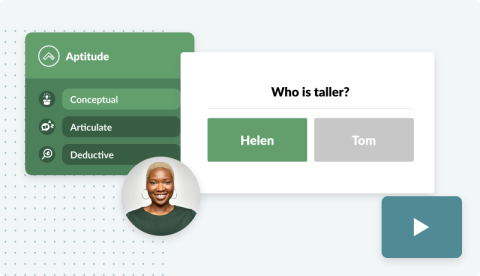
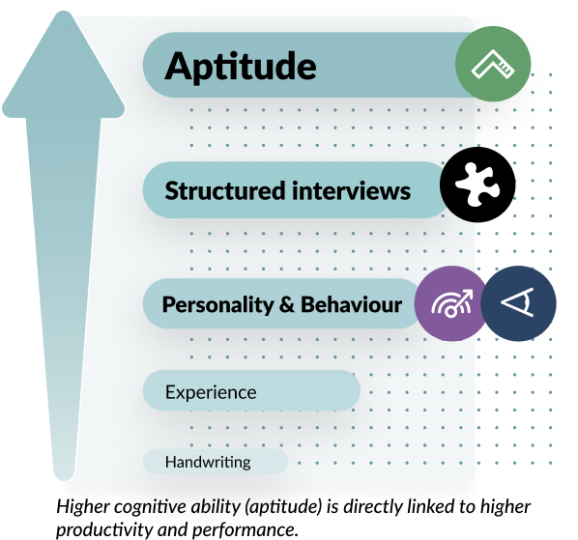
Why use the Thomas Aptitude assessment?
Measuring the aptitude of a candidate helps you to understand if that individual will be able to quickly grasp the requirements of a role, whether they are able to learn quickly and solve problems in different scenarios.
This insight makes it easier to select the right candidate for a role by placing an objective filter on their ability, regardless of their IQ score, qualifications, and past experience. That’s not to say that these are unimportant, but they’re not the best predictor of potential performance in a role. Research by the American Psychology Association inc. Frank L. Schmidt & John E. Hunter (1998) reviewed 85 years of research. They found that higher cognitive ability, or aptitude as it is also called, as measured by the Thomas Aptitude assessment, is more directly linked to higher employee productivity and performance in a role than experience. When you combine that with insight into a candidate’s personality and behaviour, and use structured interviews, you’ve a much better chance of finding your next top performer.
When you’re facing a skills gap and those with the right skills can’t be found or are too expensive to hire, hiring a candidate that can quickly learn the skills needed can help you reduce not just hiring costs, but also the time to hire.
How the aptitude test works
The Thomas Aptitude assessment measures an individual's aptitude in 5 key areas; Reasoning, Perceptual Speed, Number Speed & Accuracy, Word Meaning and Spatial Visualisation.
5 Online Assessments
The Thomas Aptitude assessment consists of 5 online tests, including reasoning, perceptual speed, number speed and accuracy, word meaning and spatial visualisation
Detailed Understanding
Gain a detailed understanding of a person’s mental capacity and how quickly they can grasp a new role/regime
Understand General Intelligence
The overall percentile is an estimate of a candidate's general intelligence, while focusing on their response to training, mental processing speed, concentration and fast track potential.
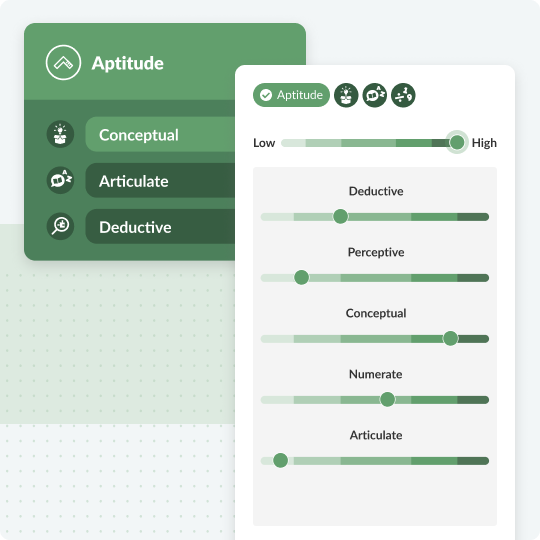
Assessment Information
- Assessment type: Aptitude
- Format: 5 assessments
- Time to complete: 30-45 minutes
- Training required: None
Validation:
Registered with the British Psychological Society and audited against technical criteria established by the European Federation of Psychologists’ Associations
Click below to download a sample candidate profile from the Thomas Perform platform

We simply would not be where we are today without the Aptitude assessment from Thomas International. The feedback that these assessments provide is invaluable.
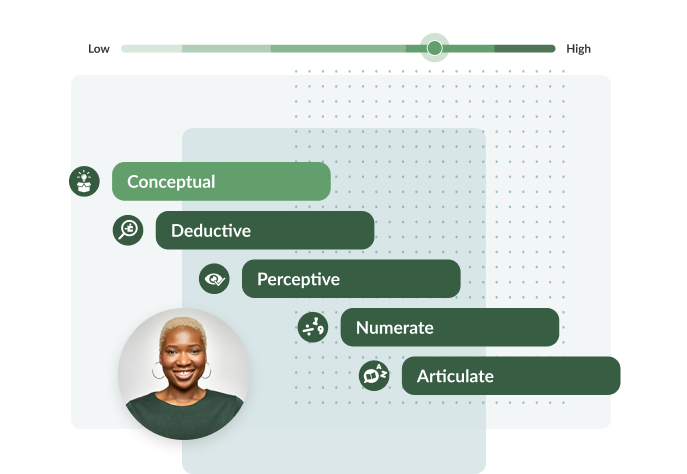
Background & Theory
The Thomas Aptitude assessment (also known as the General Intelligence Assessment, or GIA), was developed over 15 years by Dr Peter Dann in the Human Assessment Laboratory at the University of Plymouth. Thomas integrated the assessment into its product suite in 2006.
Intelligence has been defined as having fluid and crystallised components (Horn & Cattell, 1966):
Fluid Intelligence (pure processing speed) – basic intellectual processes of manipulating abstract concepts, generalisations and logical relationships (Carroll, 1993). Fluid intelligence is used to solve new problems, use logic in new situations and identify patterns. Crystallised Intelligence (learnt factors) –verbal, mechanical, and numerical ability etc. Crystallised intelligence is the ability to use learned knowledge and experience.
The Aptitude assessment is designed and theoretically underpinned by Carroll's taxonomy/classification of cognitive abilities components of 'g', which is general intelligence (Spearman's & others' general factor of mental performance). However, the assessment is concerned much more with fluid intelligence and the use of procedural rather than declarative knowledge, by measuring elementary cognitive abilities (perceptual speed, verbal reasoning etc.). This assesses what we have termed trainability rather than 'IQ'.
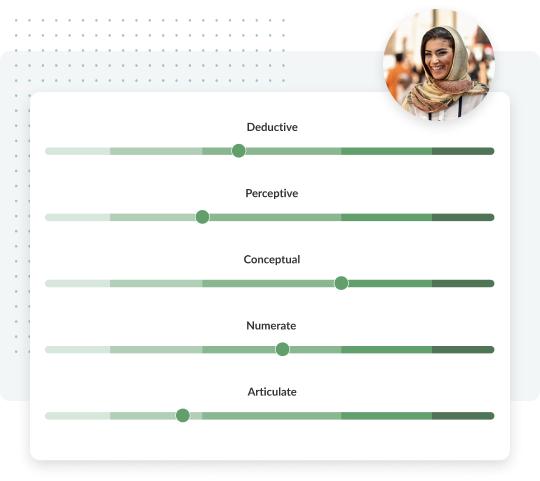
The Aptitude assessment looks at an individual's speed of processing information and ability to learn and develop new skills. The General Intelligence Assessment is used for a variety of purposes: recruitment, retention, development, management, identifying training needs, career guidance, succession planning and benchmarking.
The Aptitude assessment was first developed as a way to measure cognitive abilities and trainability of Armed Forces known as the British Army Recruitment Battery (BARB). As the assessment continued to develop, the Human Assessment Laboratory used the potential of computer technology to pioneer the research and development of item-generation whereby test items are automatically produced to create an extremely large number of different but equivalent forms of the same test (Irvine, Dann & Anderson, 1990). GIA, along with a paper-based version, was developed from the same theoretical principles and resources as BARB. Thomas International integrated the paper-based version into its product suite in 1993 and GIA in 2006.
Learn how the Thomas Aptitude assessment can help you better understand the learning speed & trainability of your people

Format of the Aptitude test
The Thomas Aptitude assessment consists of five online tests of simple cognitive abilities (i.e. abilities that rely on processes such as thought, language, decision making, learning and memory).
Each of the five tests has one type of task and all the questions in a given test are of an equal level of difficulty. The individual's score is then determined by the speed and accuracy of their responses. Scores are then compared to a sample population (the norm group) to determine whether the scores are lower, higher or in-line with the majority of that population.
Although the overall score measures 'trainability', each of the five tests measures a specific cognitive function (detailed below):
Reasoning
This test measures the ability to make inferences, the ability to reason from information provided and to draw the correct conclusions. This test assesses the ability of an individual to hold information in their short-term memory and solve problems.
Perceptual Speed
This test measures the perception of inaccuracies in written material, numbers and diagrams, the ability to ignore irrelevant information, the ability to recognise similarities and differences, and error checking. It tests the speed of semantic encoding and comparison.
Number Speed and Accuracy
This is a test of numerical manipulation and a measure of basic numerical reasoning ability. It measures the degree to which an individual can work comfortably with quantitative concepts.
Word Meaning
This test assesses word knowledge and vocabulary. It assesses the comprehension of a large number of words from different parts of speech and the ability to identify the words that have similar or opposite meanings. It assesses the ability to work in environments where a clear understanding of written or spoken instructions is required.
Spatial Visualisation
This test measures the ability to create and manipulate mental images of objects. This test correlates with tests of mechanical reasoning, and assesses an individual’s ability to use mental visualisation skills to compare shapes. It relates to the ability to work in environments where visualisation skills are required to understand and execute tasks.
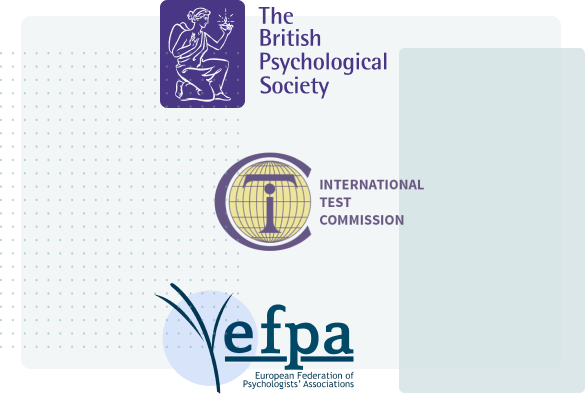
Reliability & Validity
The Thomas Aptitude test has been subject to rigorous scientific testing to determine its reliability and validity as a psychological assessment. Various research studies have shown that the GIA is a consistent and valid measure of trainability.
The GIA is registered with the British Psychological Society (BPS) after it was audited against the technical criteria established by the European Standing Committee on Tests and Testing, part of the European Federation of Psychologists' Associations.
Frequently Asked Questions
What is an aptitude assessment?
An aptitude assessment is a type of cognitive ability test that evaluates an individual's potential to learn and perform specific tasks or skills. Aptitude assessments, such as the Thomas Aptitude test, help employers determine a candidate's suitability for a role by predicting their ability to grasp new concepts, solve problems, and learn quickly. These assessments provide valuable insights into a candidate's aptitude, enabling employers to make informed decisions during the recruitment process.
What are the different types of aptitude tests?
There are various types of cognitive aptitude test designed to assess different abilities. Some common types include verbal reasoning tests, numerical reasoning tests, abstract reasoning tests, spatial reasoning tests, and mechanical reasoning tests. Verbal reasoning tests evaluate language comprehension and logical thinking, while numerical reasoning tests assess numerical skills. Abstract reasoning tests measure the ability to identify patterns and solve abstract problems. Spatial reasoning tests evaluate mental visualisation and manipulation of objects, and mechanical reasoning tests assess understanding of mechanical concepts and principles.
How can pre-employment aptitude tests help with hiring?
Pre-employment aptitude tests play a crucial role in the hiring process. These tests provide objective and standardised measures of a candidate's cognitive abilities, helping employers assess their potential job performance. By using aptitude assessments, employers can identify candidates with the right aptitude for the job, regardless of their qualifications or experience. These tests assist in predicting how quickly candidates can learn, solve problems, and adapt to new roles, enabling employers to make informed hiring decisions and select the most suitable candidates for the job.
What are the benefits of aptitude testing for recruitment?
Recruitment assessment tools such as aptitude tests for recruitment offer several benefits for recruitment processes. Firstly, it provides an objective and standardised assessment of candidates' cognitive abilities, ensuring fairness and consistency in the evaluation process. By applying aptitude tests for interviews, employers can identify candidates with the potential to learn quickly, adapt to new challenges, and perform well in specific job roles. By focusing on cognitive abilities rather than qualifications or experience, aptitude testing enables employers to assess candidates' potential and make data-driven hiring decisions. These tests also help reduce biases and subjectivity in the recruitment process, leading to better selection outcomes.
What's the difference between aptitude tests and IQ tests?
Aptitude tests and IQ tests are both cognitive assessments, but they measure different aspects of cognitive abilities. IQ tests aim to provide an overall measure of an individual's intelligence, including factors such as verbal comprehension, logical reasoning, and problem-solving. On the other hand, aptitude tests focus on specific cognitive abilities and skills relevant to particular job roles. Aptitude tests assess an individual's potential to learn quickly, adapt, and perform well in specific tasks or roles. While IQ tests provide a general intelligence score, aptitude tests offer insights into specific abilities that are crucial for job success.
How can Thomas help with aptitude testing?
As a provider of aptitude assessments, Thomas offers a comprehensive and reliable solution for aptitude testing in recruitment and selection processes. Our aptitude tests, such as the Thomas Aptitude assessment, measure an individual's cognitive abilities in various key areas. By using our aptitude testing tools, employers can gain valuable insights into candidates' ability to learn, solve problems, and adapt to new roles. These assessments assist in identifying candidates with the right aptitude for specific job requirements, enabling employers to make informed hiring decisions. Our expertise in psychometric assessments ensures the accuracy, validity, and reliability of the aptitude tests, enhancing the overall effectiveness of the recruitment process.



